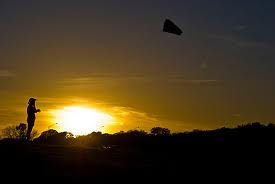LOVE POEMS IN FOUR SEASONS:
FOR VERONICA
Four decades and nine years ago, Veronica and I embarked on a journey that we are happy to look back at. The journey goes on. In these poems, milestones mark our way. We will remember.
1.Growing Old Together
LOVE IN THE BUTTERFLY GARDEN (2009)
--- The female carries the male butterfly on her back while they reproduce, and then the female eats the male while waiting for the pupa to become another butterfly, and then she dies shortly after. --- Bohol Butterfly Farm Guide Felix.
1.
How a butterfly farm can turn
an upside down imitation of life,
haunts me still this side of art as life
or life as art as transfixed visions
of what we must be now:
like the gravid mariposa luring its mate
in a flight of duty -– she must bear
the male of her specie on her back
while they consummate a dance on air
not unlike our act of mating ---
she enamouring her mate
with scents purloined from blossoms
as, conjoined, they flit from flower to leaf
tumbling on air in ecstasy
not unknown to us when wild and young
and brave with joie de vivre,
for they must breed their kind
in a chrysalis of quiescence hurriedly,
urgently, before an inexorable end
where the male must be consumed
as her victual while clinging
to bramble branches bearing her pupa
seen to us now, voyeurs of unfolding
beauty and arresting splendour,
as the preening papillon bestirring
the dry air into a flutter of magic
sprung from throes of death and dying,
for she, too, must soon perish
after this function of issuing
a magnificence that for us can only be
borne of love and loving, yes,
perhaps also onto death and dying.
2.
The poet’s refrain, “how do I love thee”,
is supercilious here, cher ami,
it cannot match the male butterfly’s sacrifice,
nor this mariposa’s dying
to bear life, beauty, and splendour.
Alas, beauty is an omen here.
2. Coming Full Circle

A RIVER'S RUSH (1985)
--On a cruise along Lachine, Quebec
It is the river as mother to the sea
Entraps us into this womblike feeling of ease;
It is the river draws us to this discovery
Of need, our quiet helplessness.
We are the river ran its course
Into an engulfment of restless sea.
How far have we gone from our rivered Nara?
Or how long have we gone astray?
Does the river current come full circle
From the breaking waves of sea?
Do we meet each other, dreamlike,
In the endless stream of the world’s Lachines?
When do we come back as rivulets
In some hidden rock spring?
The river runs full circle, and we discover
We have not even halfway met.
When will my currents break into your rocks,
You distant sea, you entrapment of need
And engulfment of ease?
When will the sea create the river?
When will the river create the sea?
Where they meet in the trickle of a little garden,
Who laves the riverstones?
Who laps the greening shores?
The river’s rush is also our question.
3. The Dreaded Maelstrom

DIES IRAE (1970)
1.
Halfway, between this river stone and many rocks after,
Nara shall have gone from our echoes-call.
We have wandered into a sunken mangrove and wonder:
Is it as silent there? Are there crabs there?
What quiet mood is pinching bloodless our spleens?
This is another pool –-- navel upon the earth.
Always, always, we cannot be grown men here.
After the white rocks, after the riverbend,
Nara becomes the dreaded dream.
We have put off many plans of soulful revisiting ---
We will go on re-stepping beyond the white stones,
Each step becoming the startled rising
Into a darkened city farther downstream
Where we once resolved never to die in.
2.
Do we wake up then afraid of Nara?
But rising here is the nightmare come so soon,
Treason in the daytime, maelstrom at night:
The nightmare was of cackling frogs
And serpents rending skulls and cerebrae
Of kitemakers who sing while termite logs
Burn and children, chanting the Dies Irae,
Mush brainmatter, pulling out allegory
Like unwanted white hair, stuffing black grass
Where brain was, casting tired similes
Into dirty tin cans where earthworm wastage was:
River swells drown us where, surfacing,
We wake up knowing our days have become
Termite nights and decaying metaphors.
4. Kite Seasons We Remember
REED LAUGHTER* (1962)
(For Lourdes Veronica Lim, University of Santo Tomas, Manila, 1962)
1.
There is an old haunt, Im-nas,
Where I am singer and kite-maker emeritus
Trumpeting reed laughter after the wind
On the rib of delivered rice:
It is the kite season in Narra, remember?
Time for the kite-song, remember?
Blow, Apo Angin, blow,
We whistle for the wind.
For us, sky-struck or one with this bird
Loving mate and leaving earth on the wind,
Winged: ravishing the sun, unblinded,
We wingless and simple wait for the wind.
We while kiting comatose away lifting crags
That room the secrecies of mating frogs.
They hop with surprised grace angered by
Blushing by.
2.
Veronica, you and I, child and kite,
We shall wait for the wind:
If I were the kite, fly me to the sky,
To the bird on wing.
Should I, descending, rip my fibre
On the thorns of a fig tree
Or the curse of its flower,
Do not abduct me: I perish there.
Thinking of you: Veronica-Im-nas,
And I am kite now, inured and waiting
For the wind to ravish me free.
It is the kite season in Narra. Remember?
--- ALBERT B. CASUGA
*(From "Narra Quartet", Narra Poems and Others, 1968)
Im-nas is Ilocano for Beloved
Apo Angin is Ilocano for O Wind
































